The Electronic Intifada 30 August 2003

Jonathan Cook
In the rare event of articles critical of Israel breaking into the mainstream US media, a flood of denunciations from letter writers and Zionist lobby groups usually follows. Editors insist that their coverage is not affected by such tactics. But the truth is that these well-financed groups believe it is worth investing huge amounts of time, energy, and money in organising these campaigns.
Here we look at one instance of the lobby in action. On 27 May 2003, a commentary piece by British journalist Jonathan Cook, entitled “A cage for Palestinians: A 1,000-kilometer fence preempts the road map”, was published in the International Herald Tribune.
The article discussed the wall Israel is currently building around the West Bank. It was possibly the first time a mainstream American newspaper published a piece suggesting that the wall was being used by Israel to fatally undermine the Road Map — a theme later taken up by several publications, including the New York Review of Books, which quoted Cook’s article at length.
Three days after publication, the Tribune’s letters column was dedicated exclusively to letters from Israeli and American Jews criticising the article (below).

Although the original article dealt with Sharon’s intention to use the wall to preempt the Road Map by creating a tiny Palestinian state, none of the letter writers were interested in addressing this central issue. Instead most focused on a single phrase: Cook’s use of the term “Palestinian homeland”. All were equally convinced that such a homeland had never existed.
A week later, on June 3 2003, a lengthy complaint arrived from the Committee for Accuracy in Middle East Reporting (CAMERA), an organisation that claims to monitor “fairness” in media coverage of the Middle East. Tamar Sternthal, a “senior research analyst” with CAMERA, used most of the letter to denounce the same apparently offensive use of the term “Palestinian homeland”.
Apart from a final criticism, all the points raised by CAMERA deal with the introductory paragraphs and do not address any of the substantive arguments made by Cook. On 22 July, CAMERA then published a character assassination of Cook based on its original letter of complaint to the Tribune on its website under the headline “Cooked up charges against Israel”.
The Electronic Intifada has obtained a copy of CAMERA’s letter and Jonathan Cook’s defense of his article to the International Herald Tribune, both dated 3 July 2003.
The only additional text in CAMERA’s letter to the text which later appeared on CAMERA’s website was two initial and one final paragraph:
Unfortunately, the International Herald Tribune has now run two op-ed pieces filled with vicious, inaccurate charges against Israel in less than a month. I had earlier written you about Cesar Chelala’s May 8 column, which contained serious falsehoods concerning demolitions in Nazlat Issa, the availability of building permits for Israeli Arabs, and Israeli and West Bank water use. We still await a response and corrections on that piece.[…]
We urge the Tribune to print corrections regarding the contents of the Oslo Accords, Palestinian acceptance of those terms, and the divisions of Palestine. We also urge the paper to more rigorously fact-check its op-eds, especially when dealing with such a contentious issue as the Palestinian-Israeli conflict. We still await a response and corrections on the Cesar Chelala piece, and we look forward to hearing from you.
Jonathan Cook’s response to CAMERA’s charges
Cook’s response to CAMERA’s letter to the Tribune is instructive:
I find it fascinating that despite CAMERA’s stated aim of encouraging “accurate, balanced” reporting it is not interested in any of my substantive points about Sharon’s plans for the wall and what it is doing to ordinary Palestinians. Here is my response to their complaints.1. “Unfortunately, the International Herald Tribune has now run two op-ed pieces filled with vicious, inaccurate charges against Israel in less than a month”.
The reference to my and Cesar Chelala’s articles as filled with “vicious” charges is libelous. It implies that we have malicious motives and is therefore, from my understanding of British law, actionable in the UK and possibly elsewhere. (Incidentally, as someone who went to both Nazlat Issa and Kfar Kassem in the immediate aftermath of both sets of demolitions I think the points Chelala makes are entirely justified and accurate).
2. “With the 1947 United Nations offer, 89.4 percent of the original Mandate (comprised of Jordan and almost half of the land that was left after Jordan’s creation) would have been in Palestinian Arab hands.”
The point about the League of Nations is one of mischievous misinterpretation on CAMERA’s part. I used the phrase “partitioning the land between Jews and Arabs” mainly as variation to avoid repeatedly saying “Palestinians” but it is clear from the context that I am talking about Palestinians. Whatever CAMERA thinks about the national status of Palestinians (and I assume from the tone of this email the organisation thinks of them as simply “Arabs” who have 22 Arab states to go to) the Palestinians have NEVER had a homeland in what is now Jordan (just ask the Bedouin who live there and feel their state has been taken from them by the waves of Palestinian refugees of the 48 and 67 wars). I used the phrase “Palestinian homeland” consciously to avoid the charge, nevertheless made against me in several letters published in the IHT, that I was referring to a political-legal entity known as Palestine. I am simply referring to the space occupied by generations of Palestinians who regarded themselves as rooted to this piece of territory (despite of course its being occupied by the Turks and later the British).
CAMERA’s reason for interpreting the 1922 partition as the “division of Palestine” is clearly ideologically motivated, as evidenced later in the complaint when CAMERA uses this as the basis for calculating that the “Arabs” were offered 89.4 per cent of mandate Palestine in the 1947 offer. The fallacy in this line of thinking is immediately revealed if we consider what the Palestinians, as opposed to Jordanians, were actually offered under the 1947 deal: they got 47 per cent of the 20 per cent (what was left after the 80 per cent that had become Transjordan — and was offered to the Jordanians — is subtracted) of the 100 per cent of mandate Palestine. This is just time-wasting mathematical sophistry and tells us nothing about what it has meant to be a Palestinian over the last 56 years and to see your homeland endlessly carved up.
3. “Cook’s unfounded theme of Jewish usurpation of historic Palestine is further amplified with his reference to the Palestinian Arab’s ‘historic homeland’. He ignores, however, that the same land served as a homeland to Jews a couple thousand years before it became known as Palestine in the second century.”
I’m not sure what the basis of this complaint is: I have to infer that CAMERA believes Israelis have a right to their state, as an exclusively Jewish state, based on a biblical claim that the Jews were promised it by God. If this is their position, I find it a strange argument for what I take to be a secular organisation to make (if they really believe this, then they presumably also think Israel has a biblical right to Cyprus, Jordan and parts of Saudi Arabia and Iraq).
If we really want to look at this sort of historical argument (and in the space of 600 words in the IHT in a piece about the wall that was not possible) then all sorts of other issues are raised. Who are the Ashkenazi Jews who developed Zionism as an ideology and founded the state of Israel? Some historians, including the late Arthur Koestler, argue that many are descended from the Khazars who converted to Judaism some 1,000 years ago and have no historical connection to the Holy Land. Why do Russian Christians who immigrated on the basis of the Law of Return (and are now estimated at some 300,000 of the population) have a biblical birthright to be in the Jewish state?
And how does CAMERA know that the present Palestinian population is descended from incomers who arrived after the Jews had been expelled? Modern research reveals that the Semitic peoples of the region (Jews and Arabs) are genetically identical, confirming the common sense view that many members of the Christian and Muslim populations in today’s Israel/Palestine were converts from Judaism. Not that I want to engage in any of these arguments. I think they are irrelevant to questions of resolving more recent historical and political injustices. I simply point out that the view of history provided by CAMERA is more than simplistic.
4. “Why didn’t the Palestinians seek to establish a state in the West Bank and Gaza when they were under Jordanian and Egyptian control, respectively, from 1948 to 1967?”
This claim — essentially that the Palestinians only have themselves to blame — barely merits a serious response. Which Palestinians are we talking about here: the millions languishing in refugee camps in Lebanon, Syria and Jordan under the auspices of UNRWA? Or those living in the camps of the West Bank and Gaza under the auspices of UNRWA? Or those who live in West Bank and Gaza as non-refugees? And how are the leaderless Palestinian masses, scattered to the winds, supposed to organise themselves into a state without an internationally enforced solution that compels Israel to honour its UN resolutions. I would be fascinated to hear CAMERA’s answer.
5. “Cook egregiously misstates the contents of the Oslo accords? Borders was one of the issues left to final status negotiations (Article V of Declaration of Principles). If the borders were spelled out under the Oslo accords, as Cook claims, why were they included in the issues?”
I concede only having committed the error of simplification here, prompted by the need to gloss over complex historical processes because of a shortage of space (in this case little more than 600 words). Yes it is true that final borders are not delineated in the accords (though I did not mention this in the piece, despite CAMERA’s claims) but this is hardly because Israel was considering giving the Palestinians MORE than the 22 per cent, ie. the West Bank and Gaza.
It has been consistent Israeli policy post-1967 — repeated by successive prime ministers — not to give up any parts of the West Bank and Gaza considered vital to Israel’s security (as defined of course by Israel). At the eruption of the intifada (and beyond the proposed final implementation date of the Oslo accords), Israel was still holding on to some 60 per cent of the West Bank and 20 per cent of Gaza. The Oslo process — combined with Israeli prime ministers’ repeated assertion that the country would never return to the pre-1967 borders — left no doubt that what Israel was offering the Palestinians was LESS than the 22 per cent.
If I am inaccurate on this point it is only in ascribing more generous motives to Israel than the historical record would support. If CAMERA can cite a speech or document by an Israeli leader made during the Oslo period in which he or she seriously discusses giving the Negev, the Galilee or maybe Tel Aviv to Palestinian control I would like to see it.
6. “While the Palestinians might have accepted the [Oslo] terms on paper, they did not accept them in practice.”
CAMERA claims that the Palestinians “in practice” rejected the terms of Oslo. This may be true but only in the sense that Israel rejected them “in practice” too. Israel failed to withdraw from the occupied territories to the extent and by the dates spelt out by the various accords. It also continued expanding the settlements, doubling the number of settlers during Oslo. The question therefore reduces to one of chicken and egg: who “in practice” broke the deal first. The answer, I suspect, is to be found in my next point.
7. “Cook’s language - that Palestinians are “caged” in - is indicative of a disturbing underlying assumption: that Palestinians have an incontrovertible right to enter Israel regardless of ongoing terrorism.”
CAMERA should check its own standards of accuracy here. Far from keeping Palestinians out of Israel because of terror attacks, the policy of general closures was instituted in 1991 — three years before Arafat’s return from Tunis and three years before the first Hamas suicide bombings, in the wake of Jewish extremist Baruch Goldstein’s massacring of 29 Muslims worshippers at the Tomb of the Patriarchs in Hebron. This has been well documented by historians and journalists, including Israeli reporter Amira Hass (though her pioneering style of journalism may not be to the taste of CAMERA).
CAMERA’s stated view is that “Accurate, balanced and complete media coverage of Israel and the Middle East is vital to public understanding of events in that important region and, ultimately, to sound policy-making”.
I agree. I am, however, intrigued as to why this approach by CAMERA only ever seems to apply to news reports and comment pieces critical of Israel. I would hate to think that their prime concern is not “accurate, balanced” coverage but rather a policy of intimidating journalists (and newspapers) that dare to think in non-conventional ways about what is going on in the Israel-Palestine conflict.
The Tribune’s and CAMERA’s responses
After receiving Cook’s response to the CAMERA complaint, the International Herald Tribune refused to issue a “correction”.
CAMERA’s complaint about the May 27th article and subsequent treatment of Cook follows the organisation’s typical pattern of avoiding the substantive, undeniable points embedded in the articles they complain about — while ascribing dark motives to the journalists who write them, in an attempt to achieve through character assassination what their convoluted arguments could not.
By sidestepping the important issues and obvious contradictions inherent in Israel’s building of a wall which will leave between 100,000-400,000 Palestinians inside its boundaries to say nothing of the entire population of 100,000 Qalqiliya residents caged within their own city, and by advancing racist views of the history of Palestine and the attachment of Palestinians to their historic homeland that echo Golda Meir’s infamous statement that “There was no such thing as Palestinians, they never existed” (15 June 1969), CAMERA makes it clear — however many times the word “balance” appears on its mission statement — that it believes that Israel alone has the right to decide the fate of the Palestinians and Palestinian land.
Armed with this mentality, CAMERA is able to explain away — as a simple matter of permit problems — Israel’s massive demolitions of Nazlat ‘Issa — the main commercial market for an entire region — at a time when Christian Aid and other development agencies report that 60 per cent of all Palestinians live below the poverty line (a figure that rises to 80 per cent in parts of the Gaza Strip).
Any journalist who isn’t horrified by Israel’s ongoing and systematic repression of the entire Palestinian population and Palestinian civil infrastructure is a journalist that either doesn’t visit the occupied territories that much, or one who fails to understand the obvious point that the resolution of the Israeli-Palestinian conflict is not going to happen as long as Israel insists on negotiating, with bulldozers and weapons rather than compassion and wisdom, with the people it has dispossessed for more than half a century.
When journalists express the horrors they witness as they work as our eyes and ears around the world, and are subsequently personally targeted — often successfully, given the obsequious amount of space given to the letters full of distortion and denial that appeared on the Tribune’s letter’s page — for merely stating the obvious conclusions that any decent person would come to after a 3-day tour of the West Bank and Gaza, something is very wrong with the way the media works.
In a world where, on a daily basis, global news networks such as CNN dismiss basic facts — such as the internationally-recognised status of Israel’s presence in the West Bank and Gaza as a military occupation — as mere “Palestinian opinion”, there is an increasing need for journalists to forthrightly describe what they see.
This is doubly true when one considers the lengths organisations such as CAMERA go to discourage reports in the US media that communicate the realities of daily life that Palestinians face. This intimidation, if ultimately successful, can only ensure that American voters continue to unwittingly underwrite Palestinian misery with billions of dollars of US foreign aid which funds Israel’s 36-year-old occupation.
Nigel Parry
Nigel Parry is a co-founder of The Electronic Intifada and Electronic Iraq. He lived in Palestine from 1994-1998.




